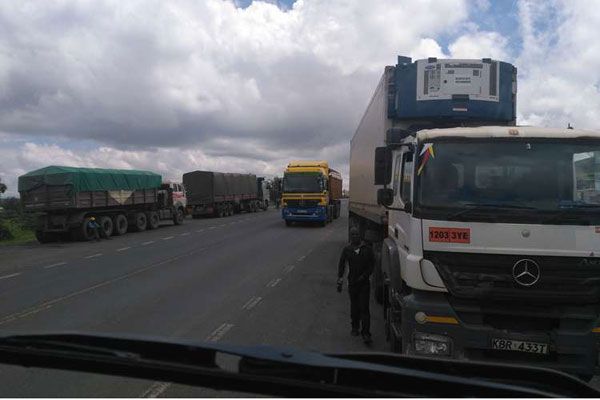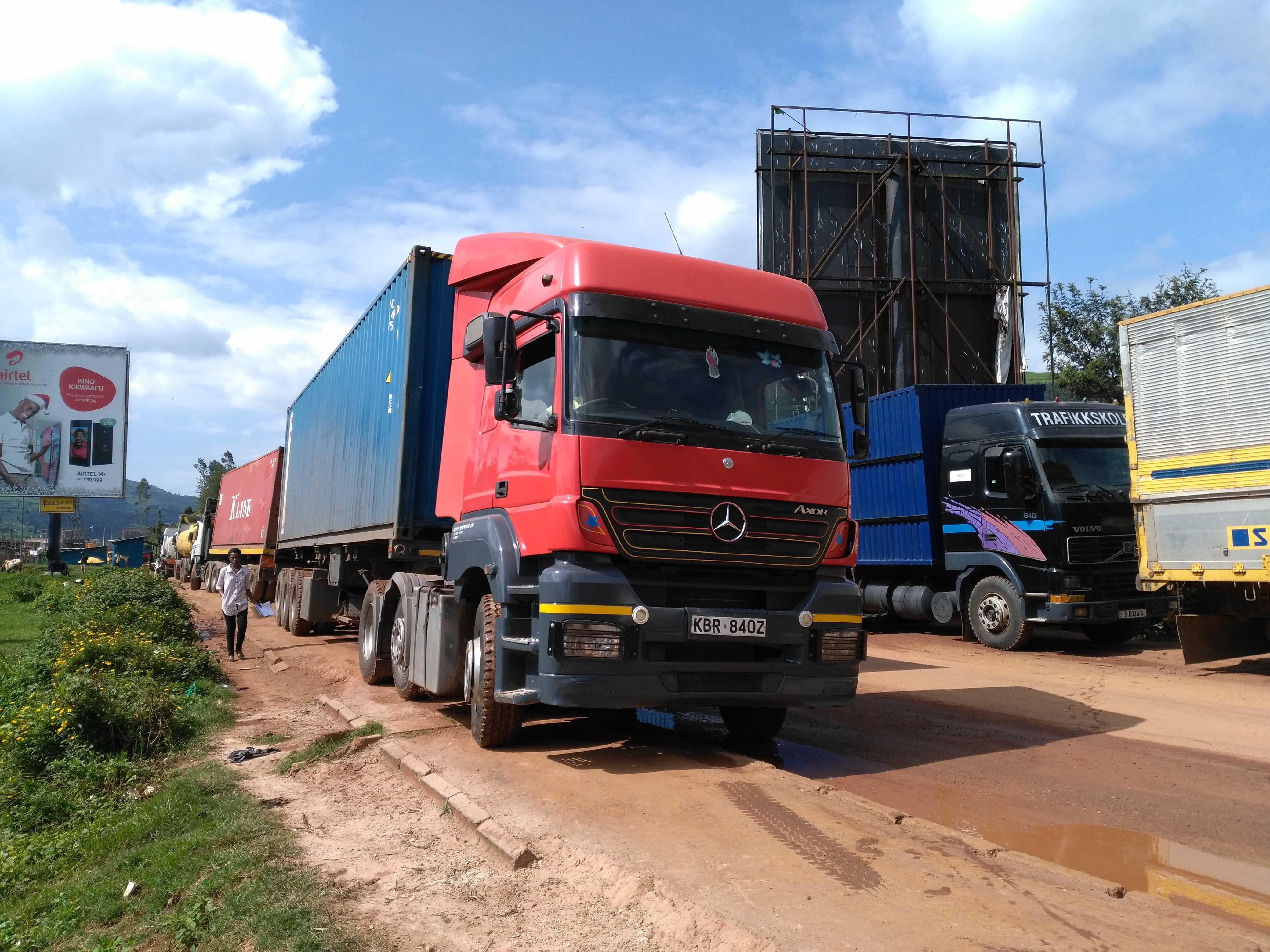
The 10 years of hauling cargo from Mombasa port to Kigali have made Pascal Rubimbura an unusually cautious long distance trucker.
Over the period, the Rwandan driver has come to appreciate the dangers of fatigue and speeding, the two major causes of accidents along the Northern Corridor.
"I drive between 40kph and 60kph," he says. "I never drive when tired. I try to get as much rest as I can but in case I get tired, I park by the roadside and take a quick nap."
I recently accompanied Mr Rubimbura to Kigali, a journey that lasted five days. On the first day, we left Mombasa at 9.30am, had a brief stop at Mariakani weighbridge and finally arrived at the Machakos junction by 10pm. Like most drivers, Mr Rubimbura had an option to book himself into a guesthouse but frugality confined him to the cabin of his truck for the next three nights.
"Most rooms cost Sh1,000 ($10) and at times they are not the best. Some even have bedbugs. Most of us prefer to sleep on the bed in the cabin even if it is uncomfortable," he says.
To beat traffic on the roads, weighbridges and border posts, most drivers find themselves sleeping for about four hours after driving for about eight to 10 hours.
We drove from Machakos Junction to Luanda, a few kilometres past Kisumu on the second day, with two stops along the way, getting to Busia border on the third day. Mr Rubimbura showed signs of fatigue as we queued through the weighbridge.
"We will stop early today near Kampala so that we can rest well," he says. On arrival in Kigali, Pascal drove to the transporter's yard and parked the truck for off-loading.
"I am going home to rest for two days before I start my journey back to Mombasa," he says. Depending on destination, most of the drivers spend up to 24 days in a month on the road.
Most drivers plying the Mombasa-Kigali route take three to four days and do three trips in a month.
A round trip takes about eight days and most of them rest for two days in Kigali before embarking on the journey back. Those transporting goods to Burundi and Democratic Republic of Congo take more days.
Road safety agencies have blamed fatigue for most of accidents on the Northern Corridor. In Kenya, data from the National Transport and Safety Authority (NTSA) shows crashes involving heavy commercial vehicles accounted for 18 per cent of accident in 2015 with 514 people losing their lives.
Between January and April 26 this year, 198 people had been killed in crashes involving trucks.
In Uganda, total number of crashes in 2014 according to the Annual Crime and Traffic Report was 2,845. About 95 per of goods in Uganda is transported by road. Rwanda's Ministry of Infrastructure reported 507 road crashes deaths in 2013.
On the trip to Kigali, we found trucks that had overturned near Mariakani while others had stalled on the Gilgil-Kericho road in Kenya.
On the third day we encountered a fatal road crash on the Masaka-Mbarara highway in Uganda on May 20. A lorry and a saloon car had collided head on, killing six family members.
To tame road crashes along the corridor, Kenya, Uganda, Rwanda, Burundi, South Sudan and Democratic Republic of Congo have launched a project to reduce accidents.
The project managed by Northern Corridor Transit and Transport Coordination Authority (NCTTCA) plans to build 141 roadside stations in the six countries. Construction of 67 roadside stations at an estimated cost of Sh7 billion has been given priority.
The roadside stations will be rest stops for heavy commercial vehicles, passenger vehicles and other motorists along the Northern Corridor.
The roadside stops will have hotels with accommodation, shops, supermarkets and banks. They will also host service stations and workshops for vehicle repair. There will be a specific workshop at each station for repairing trucks as well as designated parking space for trucks and buses.
"Drivers work long hours which leads to fatigue, loss of concentration and poor health all of which are major contributors to accidents," states NCTTCA on its website. "The road side stations program comes to enhance road safety and health along the Northern Corridor".
Mr Donat Bagula, the NCTTCA executive secretary told the Business Daily that loss of lives of travelers on the route has an economic impact as most of them are breadwinners, meaning their families suffer after they die or become disabled.
"It gets worse if the goods and truck are completely destroyed but the biggest impact is the loss of lives. The drivers are breadwinners and in the African context the immediate and extended family are affected.
Each of the six countries will have a number of the rest stations depending on the stretch of the corridor and border points connecting to other member countries.
Task forces
According to the NCTTCA, Uganda will have the highest number of roadside stations with 27 followed by Kenya with 22.
Rwanda and DR Congo will have seven each while Burundi and South Sudan will have two.
The authority says the roadside stations project was launched at an investor's conference in Nairobi on April 28 last year.
The conference was held to seek public, private partnership in the construction of the roadside stations.
Member countries are expected to form task forces that will spearhead the projects.
"Kenya has a task force in place which is currently working on the guidelines for investment," says Mr Bagula. He said in Kenya, two pilot roadside stations will be constructed in Sultan Hamud and Salgaa.
Documents from the NCTTCA show that the Sultan Hamud project is expected to cost Sh118.9 million while the one in Salgaa will cost Sh114 million.
Uganda Roadside Stations Task Force was launched in April during the Infrastructure Development and Private Sector Promotion programs in Kampala.
Mr Bagula said other countries on the Northern Corridor are also forming teams to implement the projects.
"I was in Rwanda recently and soon they will launch their task force," he said.
Mr Yasin Mugisha, a truck driver, on the Mombasa-Kigali route, says most long distance drivers make three stops to avoid the officers, whom he claimed, demand bribes.
"There is almost a standard fee of Sh50 we give to police officers at roadblocks, but those in Naivasha, Salgaa and Burnt Forest in Kenya do not take less than Sh1,000," he says.
He claimed drivers are locked up if they do not part with the bribe.
There are no blocks in Uganda and Rwanda. But there were police officers along the way to look out for motorists driving beyond the speed limit.
Mr Bagula said the presence of facilities such as restaurants and banks would spur growth around the road side stations by creating employment.
"Our aim is to use the road side stations not only to tame road crashes but also spur economic activities along the corridor to improve the lives of people," the NCTTCA executive director says.
The road side stations will also have parking lots that will curb parking of trucks by the roadside, which at times lead to accidents mostly involving pedestrians and hawkers selling to travelers along the highway.
Dr Duncan Kibogong, a deputy director for safety strategies at the NTSA in Kenya, says heavy commercial vehicles parked by the roadside make roads narrow and easily cause accidents.
Corrupt police officers
"Stationary trucks also cause crashes, especially at night due to obstruction," he says.
Health facilities will also be constructed at the hubs to cater for drivers in case they fall sick.
The medical centers will also serve people living with HIV.
To ease number of road blocks, the resting stations will also have police check-points along the Mombasa-Malaba highway.
Some of the long distance drivers who spoke to the Business Daily said they have to bribe traffic police officers at the roadblocks even when they have not committed any offense.
While Uganda and Rwanda have done away with roadblocks, Kenya still retains them with police saying they are used for security checks.






